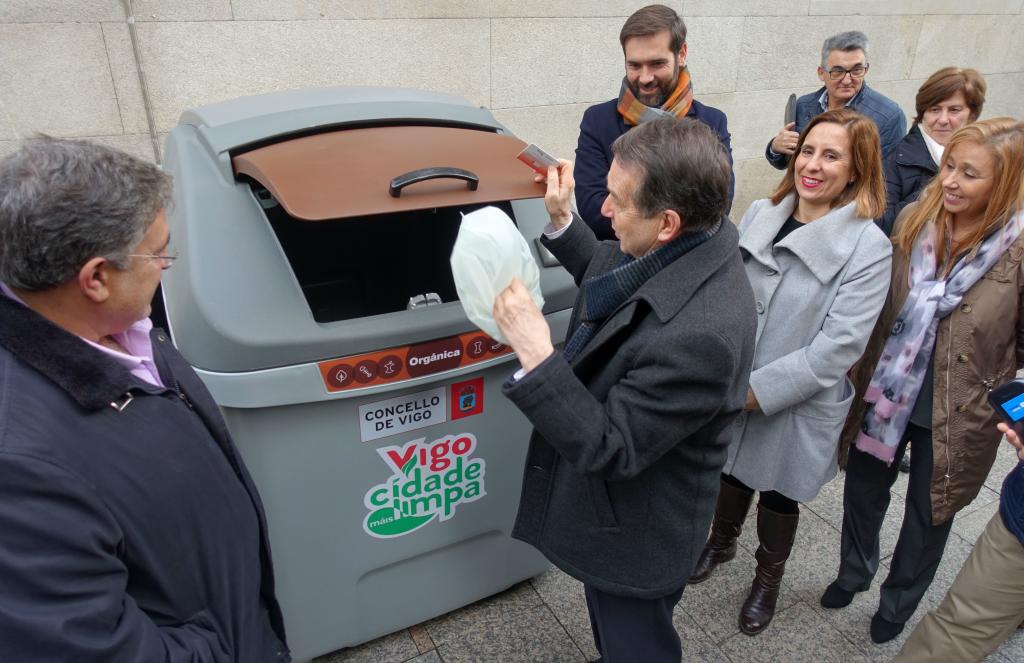Thessaloniki gets ready for its metro launch in November
The underground rapid transit lines have been under construction for almost two decades due to various project delays
 TheMayor.EU logo
TheMayor.EU logo 
Vigo organic waste container, Source: Organic waste separation containers tested in Vigo / hoxe.vigo.es
The Spanish city wants to turn food waste into natural soil fertilizer
Vigo has launched a pilot project with brown lid containers in Coia and Navia, reported the local authority. If successful, it will enable turning organic waste into a natural fertilizer, to be used in agriculture.
The mayor of Vigo unveiled on Monday the new organic waste containers which will be installed in Coia and Navia neighbourhoods as a pilot. They will be used with 100% recyclable bags and the containers will open with the PassVigo card only. "The use of the new brown container is voluntary and that is why it is used with PassVigo. Shorty, the European Union will oblige us and we are already moving forward," he said during the event, quoted by the municipal website.
The containers are intended to deposit those debris that occur in the preparation of raw or cooked meals and any leftovers such as eggshells, peels of potatoes and fruits, coffee blisters, infusions, etc. The aim is to give a second life to this type of waste, obtaining a quality natural fertilizer that can be used for both agriculture and gardening.
One of the main new features of these containers is that in order to open them you will have to use the PassVigo Card and to deposit the waste. These containers will be installed in addition to the existing ones in the city for the separate collection of paper and cardboard (blue), glass (green), plastics, bricks and cans (yellow), disused batteries, domestic used oil, clothes, footwear and accessories.
In recent years, Vigo has become the Galician city with the most awards for cleaning its streets and appears in all clean city rankings from Spain, boasts the municipality. Vigo is also the top recycling city in Galicia autonomous community.
The main environmental threat from biowaste is the production of methane, a strong greenhouse gas, emitted by the decomposition in landfills. The EU therefore aims to mitigate this problem through the Landfill Directive (1999/31/EC) which obliges EU Member States to reduce the amount of biodegradable municipal waste that they landfill to 35% of 1995 levels.

The underground rapid transit lines have been under construction for almost two decades due to various project delays

Now you can get your wine in Talence by paying directly in Bitcoin

That’s because the state has to spend money on updating the railway infrastructure rather than subsidizing the cost of the popular pass

Rethinking renewable energy sources for the urban landscape

The examples, compiled by Beyond Fossil Fuels, can inform and inspire communities and entrepreneurs that still feel trepidation at the prospect of energy transition

Now you can get your wine in Talence by paying directly in Bitcoin

The 10th European Conference on Sustainable Cities and Towns (ESCT) sets the stage for stronger cooperation between the EU, national and local level to fast track Europe's transition to climate neutrality.

At least, that’s the promise made by the mayor of Paris, Anne Hidalgo

The underground rapid transit lines have been under construction for almost two decades due to various project delays

At least, that’s the promise made by the mayor of Paris, Anne Hidalgo

Hostal de Pinós is located in the geographical centre of the autonomous region

Despite its church-y name, the district has long been known as the hangout spot for the artsy crowds

Urban dwellers across the EU are having a say in making their surroundings friendlier to people and the environment.

Forests in the EU can help green the European construction industry and bolster a continent-wide push for architectural improvements.

Apply by 10 November and do your part for the transformation of European public spaces

An interview with the Mayor of a Polish city that seeks to reinvent itself

An interview with the newly elected ICLEI President and Mayor of Malmö

A conversation with the Mayor of Lisbon about the spirit and dimensions of innovation present in the Portuguese capital














